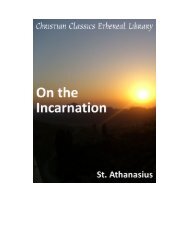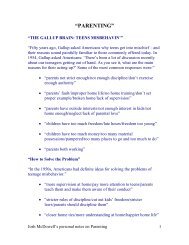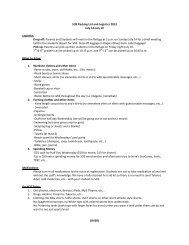Pdf Copy of Orthodoxy, by G.K. Chesterton - Christ United Methodist ...
Pdf Copy of Orthodoxy, by G.K. Chesterton - Christ United Methodist ...
Pdf Copy of Orthodoxy, by G.K. Chesterton - Christ United Methodist ...
You also want an ePaper? Increase the reach of your titles
YUMPU automatically turns print PDFs into web optimized ePapers that Google loves.
9/ 27/ 12 The Pr oject G ut enber g eBook <strong>of</strong> O r t hodoxy, G . K. Chest er t on<br />
www. gut enber g. or g/ f iles/ 16769/ 16769- h/ 16769- h. ht m<br />
had occurred at all. As I laid down the last <strong>of</strong> Colonel Ingersoll's atheistic lectures the<br />
dreadful thought broke across my mind, "Almost thou persuadest me to be a <strong>Christ</strong>ian." I<br />
was in a desperate way.<br />
This odd effect <strong>of</strong> the great agnostics in arousing doubts deeper than their own might be<br />
illustrated in many ways. I take only one. As I read and re-read all the non-<strong>Christ</strong>ian or anti-<br />
<strong>Christ</strong>ian accounts <strong>of</strong> the faith, from Huxley to Bradlaugh, a slow and awful impression grew<br />
gradually but graphically upon my mind—the impression that <strong>Christ</strong>ianity must be a most<br />
extraordinary thing. For not only (as I understood) had <strong>Christ</strong>ianity the most flaming vices,<br />
but it had apparently a mystical talent for combining vices which seemed inconsistent with<br />
each other. It was attacked on all sides and for all contradictory reasons. No sooner had<br />
one rationalist demonstrated that it was too far to the east than another demonstrated with<br />
equal clearness that it was much too far to the west. No sooner had my indignation died<br />
down at its angular and aggressive squareness than I was called up again to notice and<br />
condemn its enervating and sensual roundness. In case any reader has not come across the<br />
thing I mean, I will give such instances as I remember at random <strong>of</strong> this self-contradiction in<br />
the sceptical attack. I give four or five <strong>of</strong> them; there are fifty more.<br />
Thus, for instance, I was much moved <strong>by</strong> the eloquent attack on <strong>Christ</strong>ianity as a thing <strong>of</strong><br />
inhuman gloom; for I thought (and still think) sincere pessimism the unpardonable sin.<br />
Insincere pessimism is a social accomplishment, rather agreeable than otherwise; and<br />
fortunately nearly all pessimism is insincere. But if <strong>Christ</strong>ianity was, as these people said, a<br />
thing purely pessimistic and opposed to life, then I was quite prepared to blow up St. Paul's<br />
Cathedral. But the extraordinary thing is this. They did prove to me in Chapter I. (to my<br />
complete satisfaction) that <strong>Christ</strong>ianity was too pessimistic; and then, in Chapter II., they<br />
began to prove to me that it was a great deal too optimistic. One accusation against<br />
<strong>Christ</strong>ianity was that it prevented men, <strong>by</strong> morbid tears and terrors, from seeking joy and<br />
liberty in the bosom <strong>of</strong> Nature. But another accusation was that it comforted men with a<br />
fictitious providence, and put them in a pink-and-white nursery. One great agnostic asked<br />
why Nature was not beautiful enough, and why it was hard to be free. Another great<br />
agnostic objected that <strong>Christ</strong>ian optimism, "the garment <strong>of</strong> make-believe woven <strong>by</strong> pious<br />
hands," hid from us the fact that Nature was ugly, and that it was impossible to be free. One<br />
rationalist had hardly done calling <strong>Christ</strong>ianity a nightmare before another began to call it a<br />
fool's paradise. This puzzled me; the charges seemed inconsistent. <strong>Christ</strong>ianity could not at<br />
once be the black mask on a white world, and also the white mask on a black world. The<br />
state <strong>of</strong> the <strong>Christ</strong>ian could not be at once so comfortable that he was a coward to cling to<br />
it, and so uncomfortable that he was a fool to stand it. If it falsified human vision it must<br />
falsify it one way or another; it could not wear both green and rose-coloured spectacles. I<br />
rolled on my tongue with a terrible joy, as did all young men <strong>of</strong> that time, the taunts which<br />
Swinburne hurled at the dreariness <strong>of</strong> the creed—<br />
"Thou hast conquered, O pale Galilæan, the world has grown gray with Thy<br />
breath."<br />
But when I read the same poet's accounts <strong>of</strong> paganism (as in "Atalanta"), I gathered that the<br />
world was, if possible, more gray before the Galilæan breathed on it than afterwards. The<br />
poet maintained, indeed, in the abstract, that life itself was pitch dark. And yet, somehow,<br />
48/ 100





